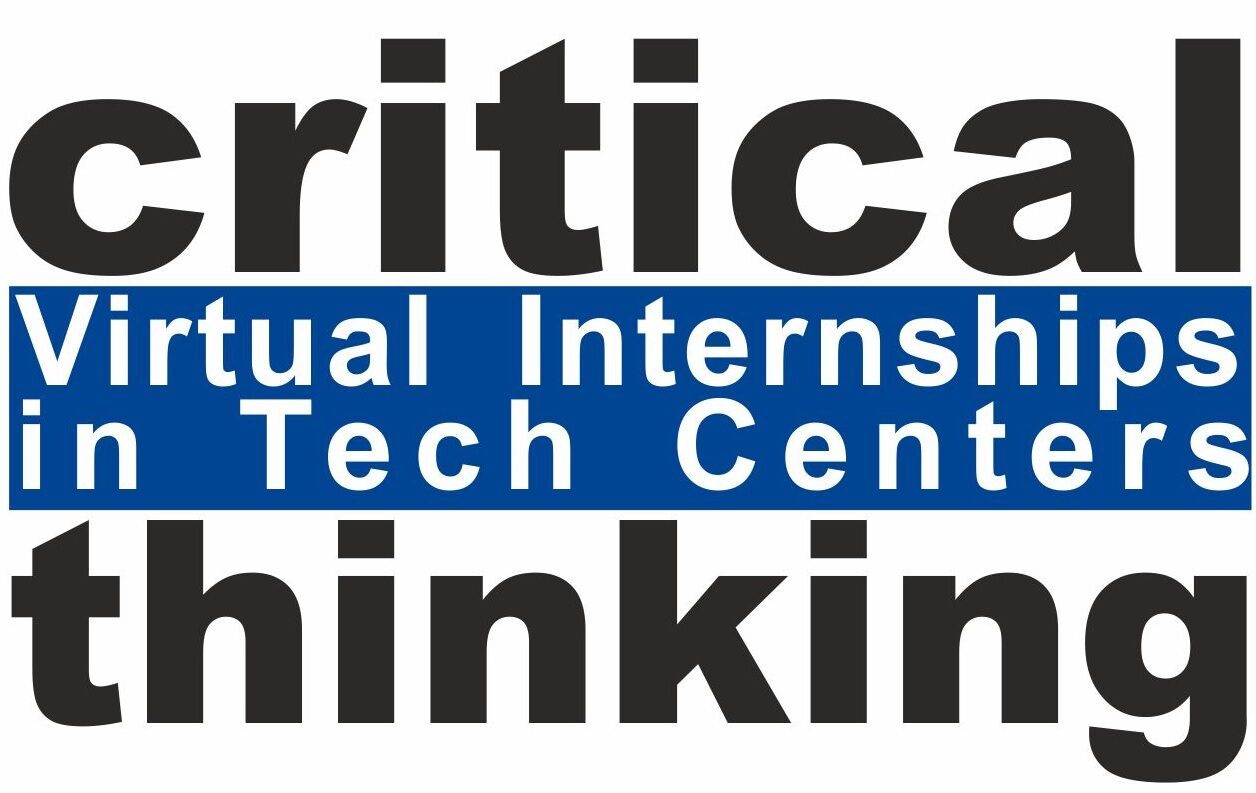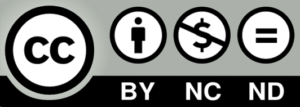An external committee of experts in innovative educational methodologies has positively evaluated the results and its educational impact of the “VIRTUAL INTERNSHIPS IN TECH CENTERS” project.
To evaluate the achievement of the results and objectives, a Total Quality System of the project was defined, which focused its attention on the results, activities and participants.
Appropriate evaluation instruments have been designed for each result and activity (transnational meetings, preparatory activities, achievement of results, network construction, training, visibility, dissemination, events…), which have been monitored and evaluated throughout the different phases of the project.
The evaluation has been carried out throughout the entire project, but it has been in the last phase when the final evaluation results of the project have been obtained.
To measure the scope of the results and objectives, specific indicators were defined for each result and phase that made it possible to measure the degree of quality as the level of execution of the objectives linked to the expected results, throughout the entire project.
PLANIFICATION PHASE
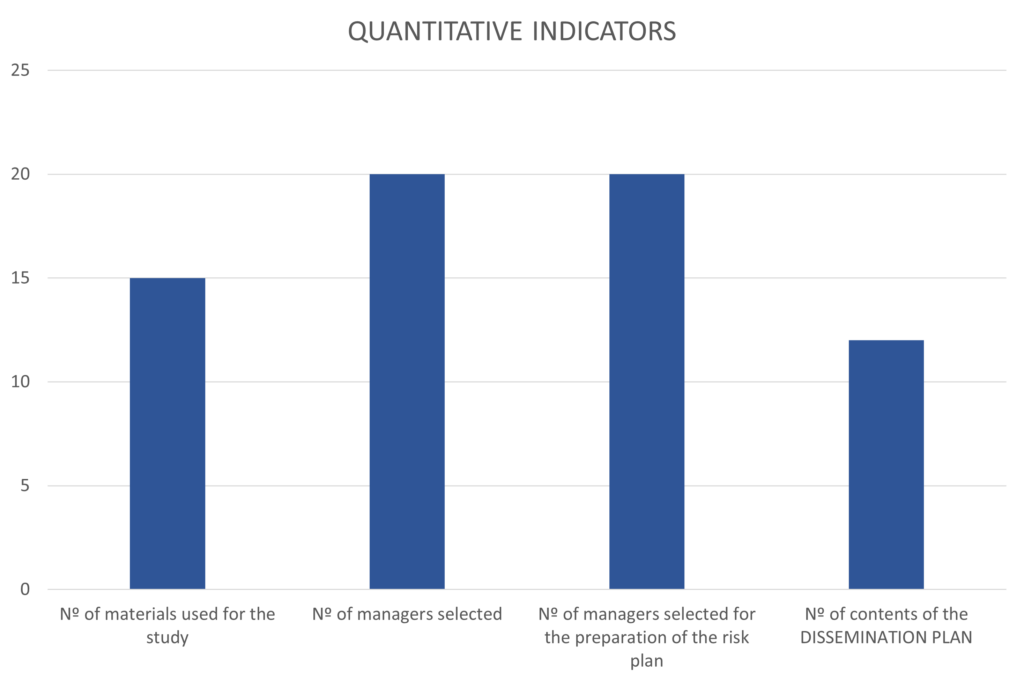
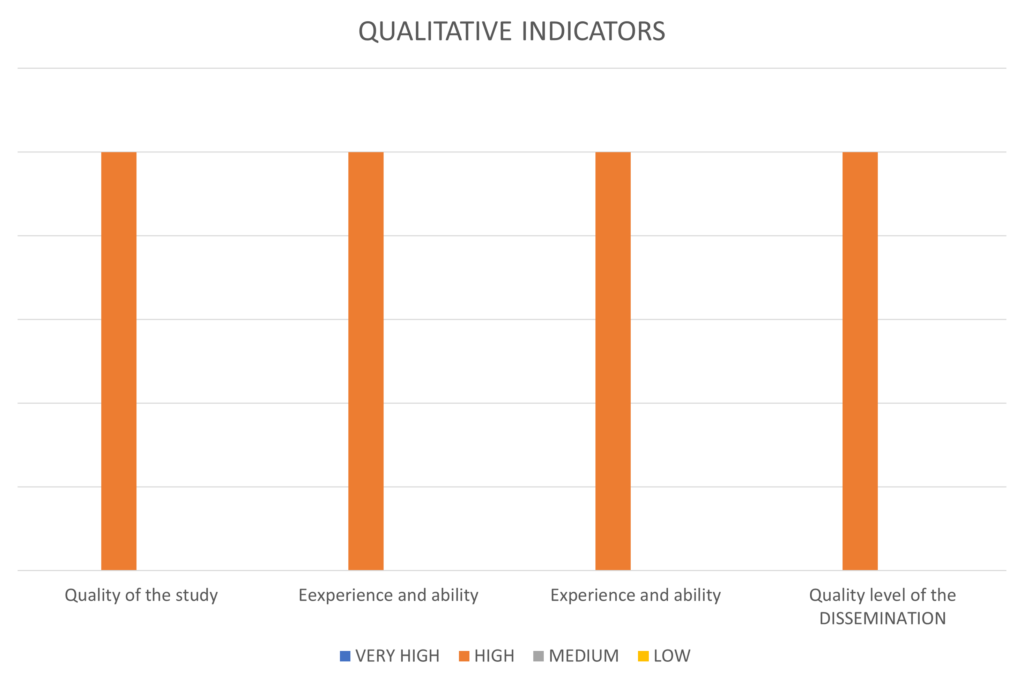
.
PREPARATION PHASE
For the preparation phase, quantitative and qualitative indicators were defined that allowed us to evaluate the achievements of the phase as a whole (activities, meetings, etc.). The results of this evaluation showed that we were not only achieving the proposed objectives, but that we were improving them in certain aspects such as: the number of participants in the phase, the number of participants expected in the internal training days, the number of coordination with collaborating entities, the training materials developed or the visibility and dissemination materials created.
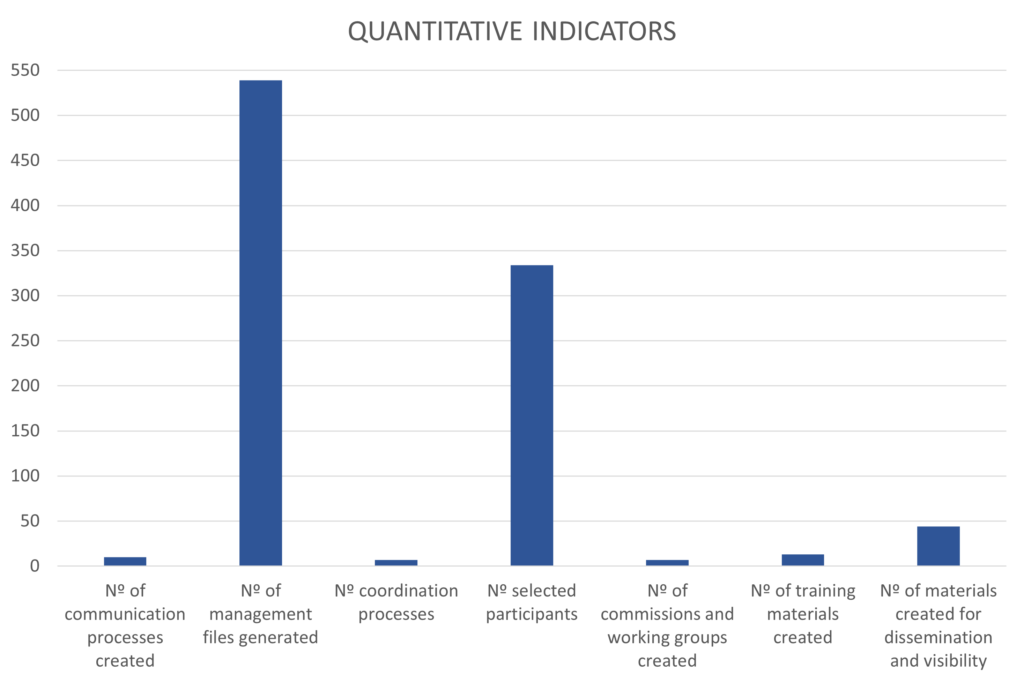
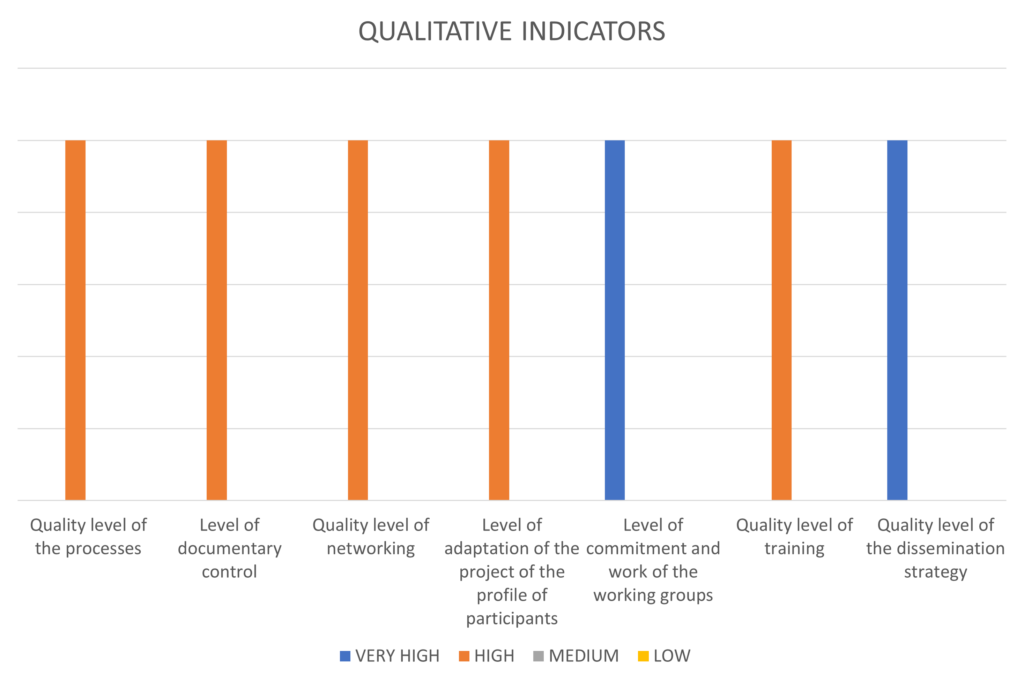
.
IMPLEMENTATION PHASE
As in the preparation phase, quantitative and qualitative indicators were defined that allowed us to assess the achievements of the phase as a whole (activities, meetings, etc.). The results of this evaluation showed that in addition to achieving the objectives, we were improving them in certain aspects. Specifically, we managed to increase participation, the number of activities, the number of evaluations carried out on the results and the entities to which we make the project visible.
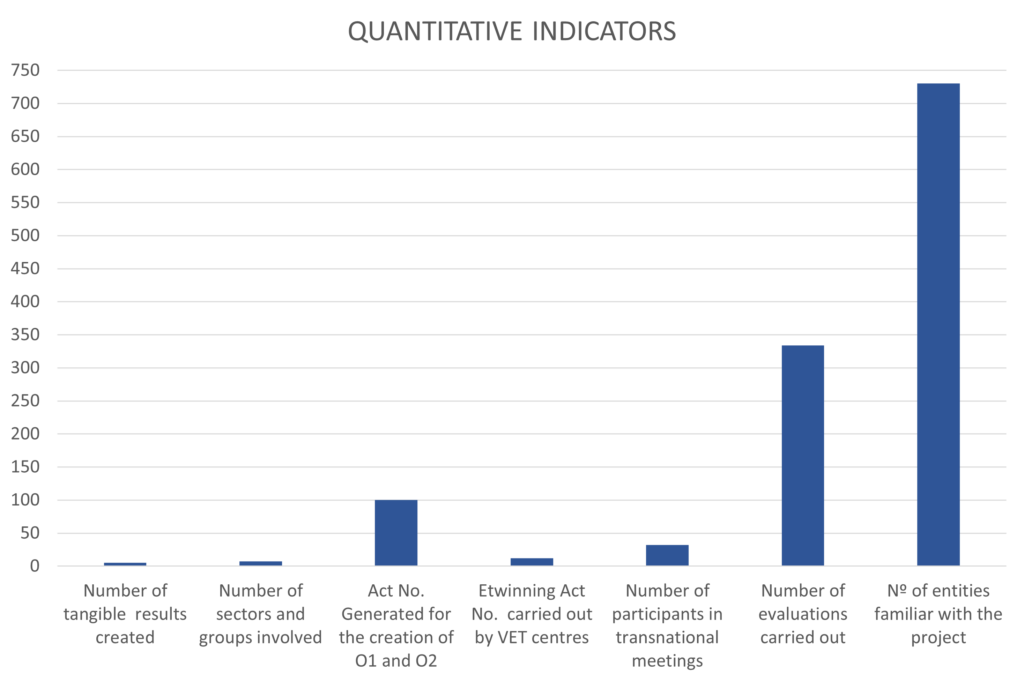
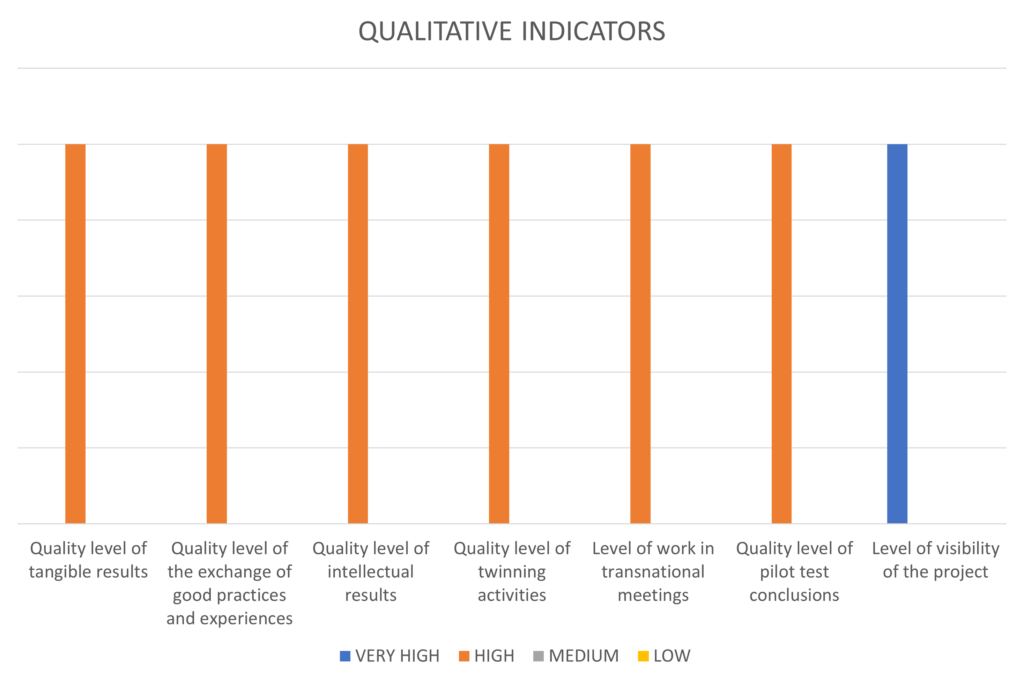
.
DISSEMINATION PHASE
As in previous phases, qualitative and quantitative indicators were established for the evaluation of the dissemination phase. These showed that we achieved the planned objectives, we even managed to raise expectations. It highlights the number of entities and participants in the activities, as well as the participation in educational innovation congresses and the creation of dissemination materials.
Specifically, the following indicators were defined:
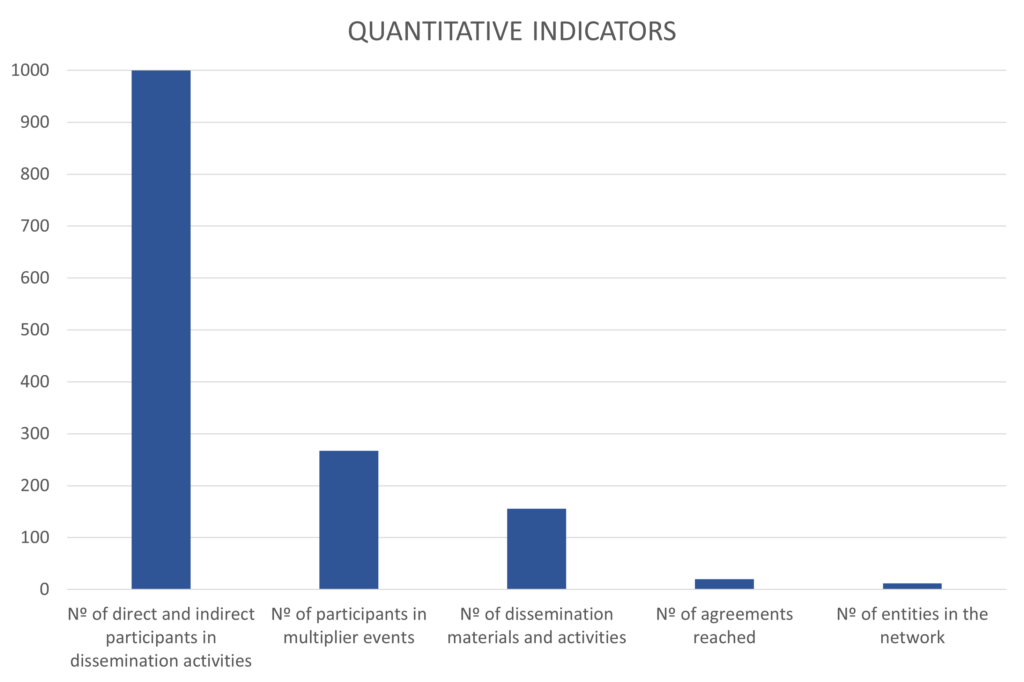
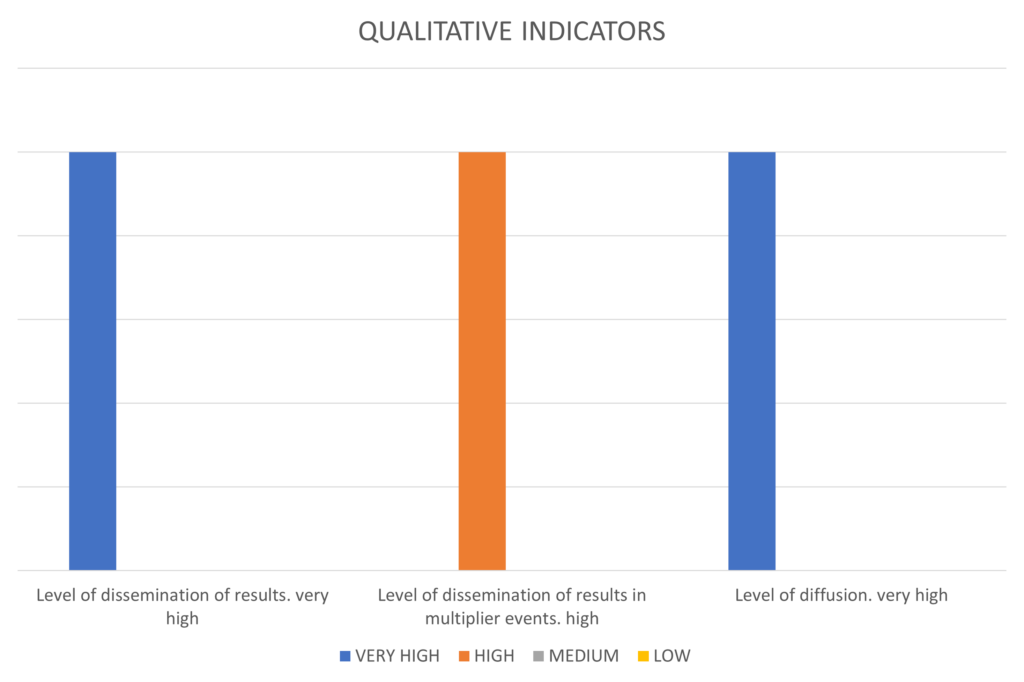
.
INTELLECTUAL OUTPUTS
The evaluation of the achievement of the results was carried out through the analysis of qualitative and quantitative indicators, as well as through satisfaction surveys to the direct beneficiaries of the results (VET students and teachers, heads of educational and technical centers and heads of technology companies).
Both the indicators and the surveys allowed us to measure the degree of quality and the level of implementation of the objectives linked to the results.
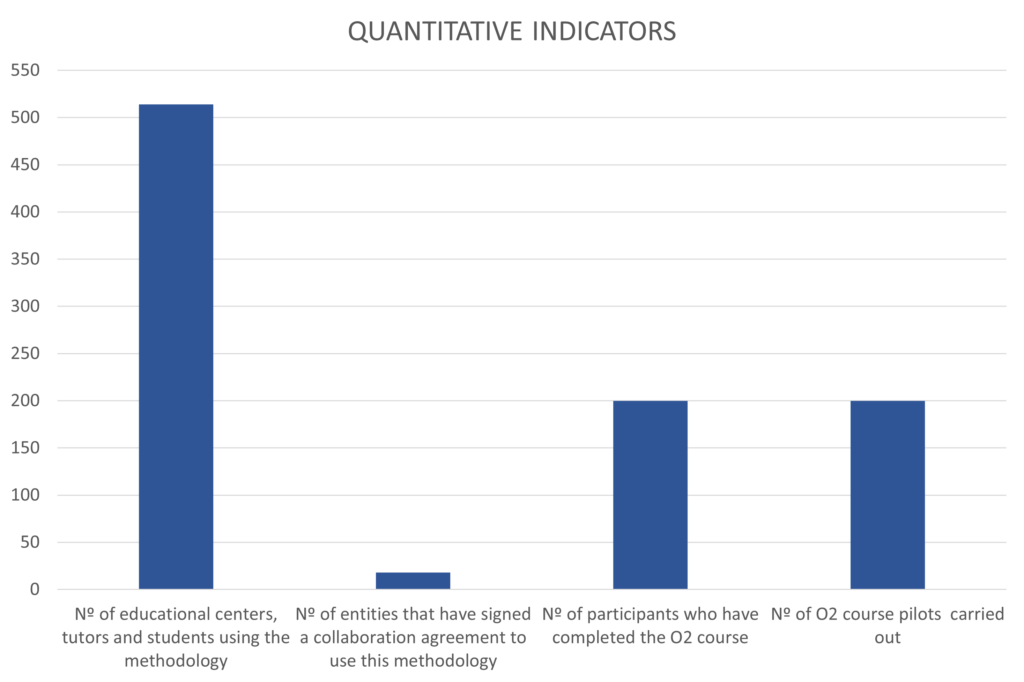
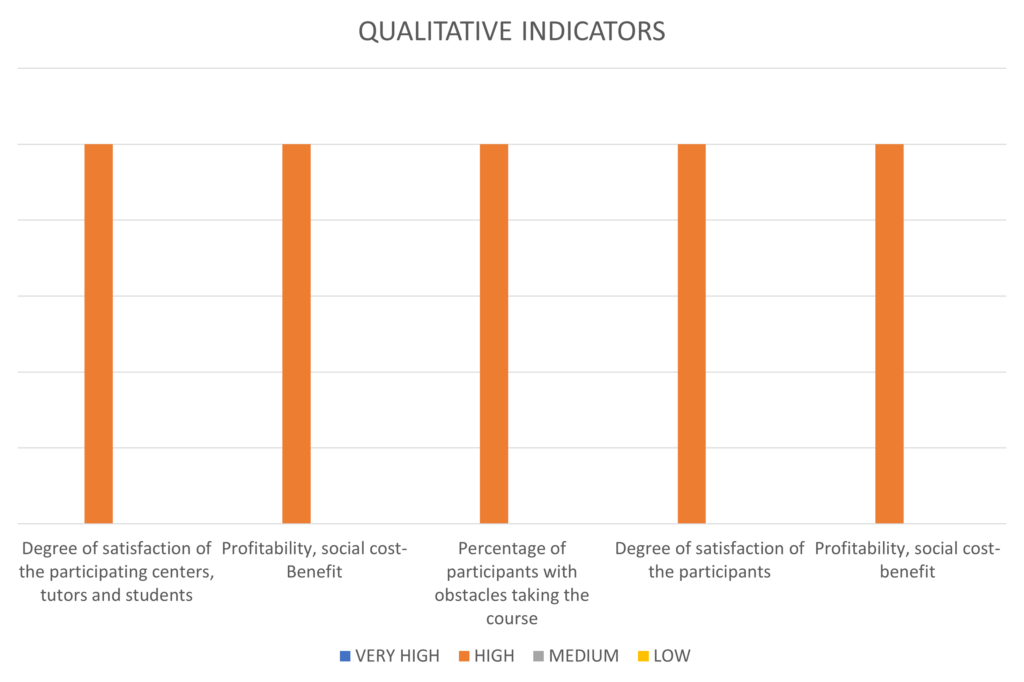
.
INTELLECTUAL OUTPUT O1
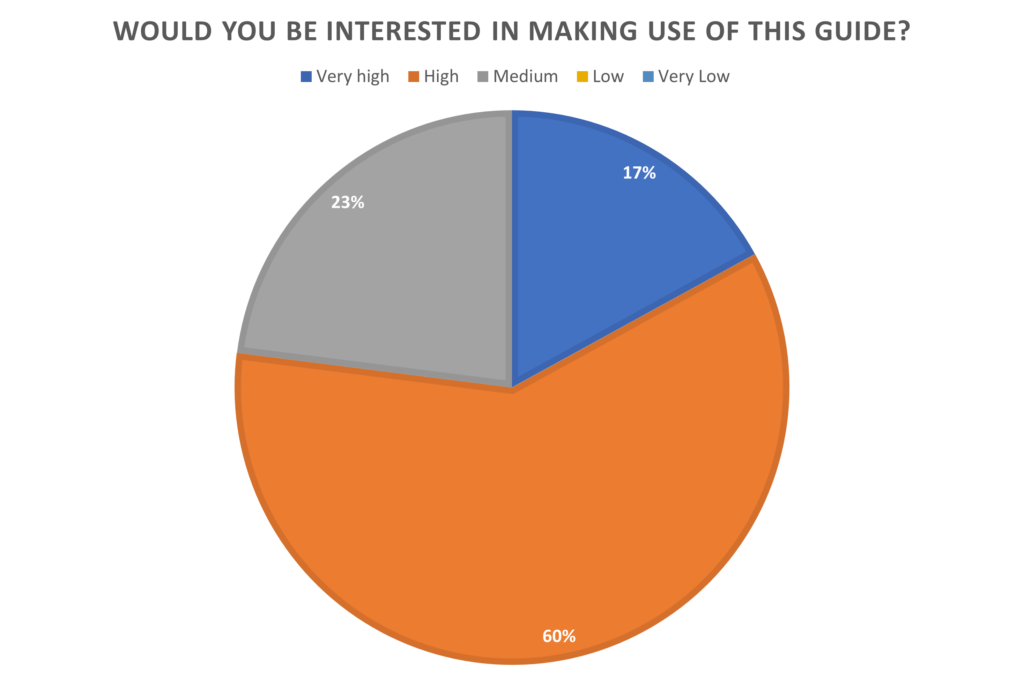
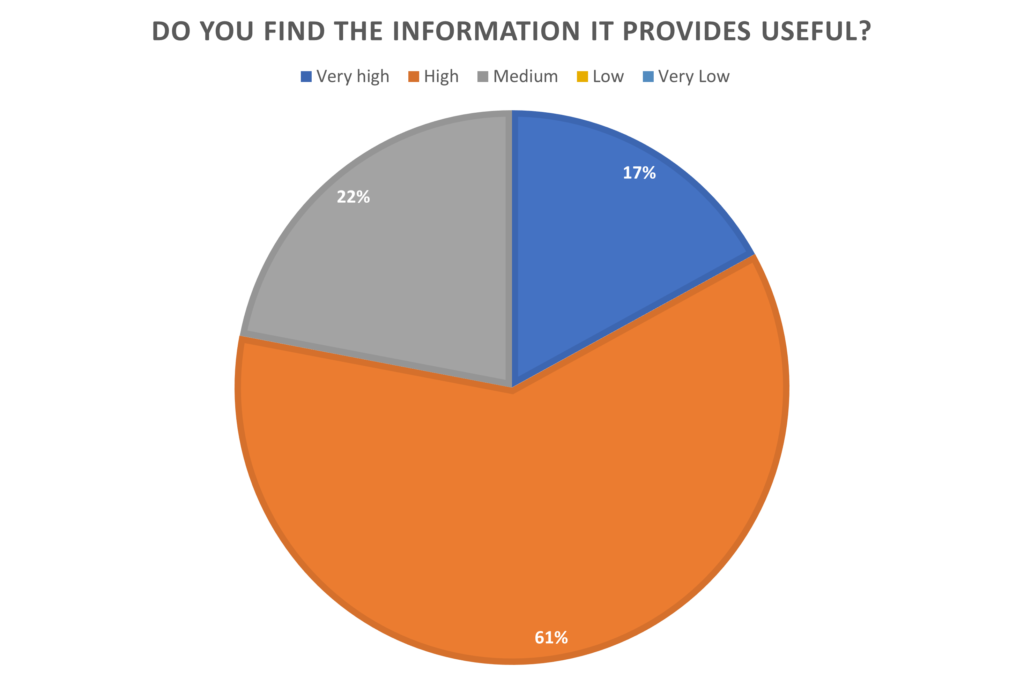
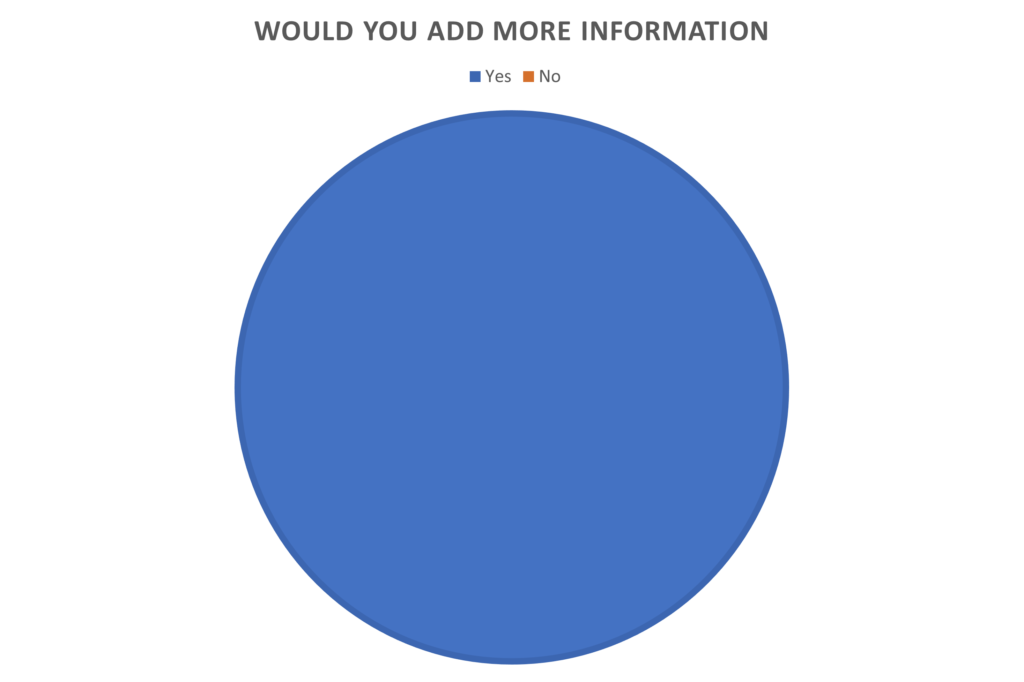
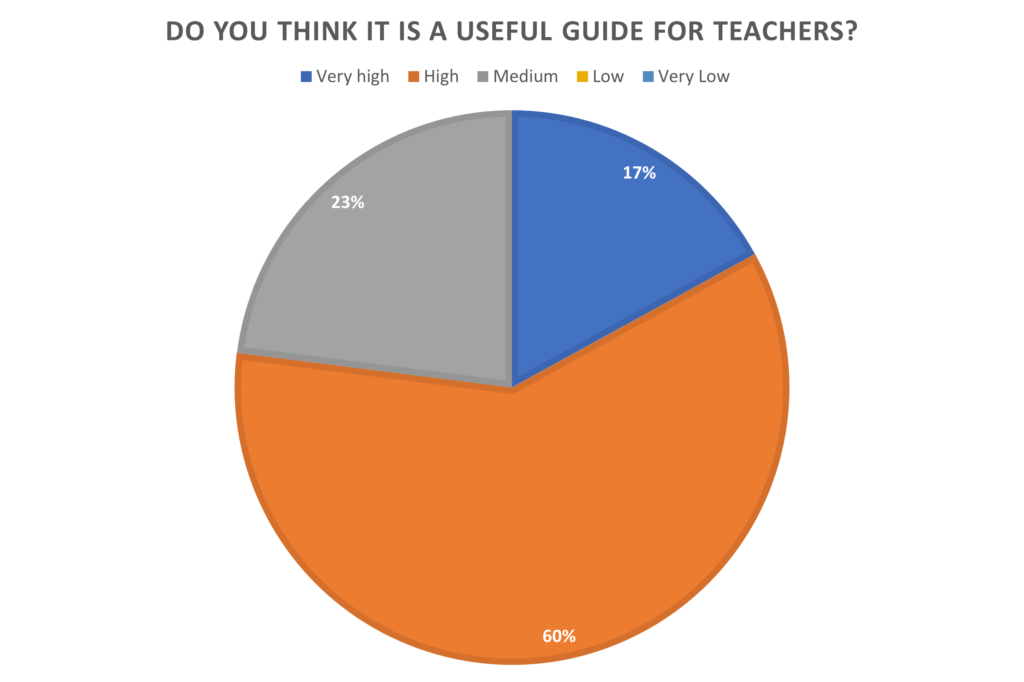
.
INTELLECTUAL OUTPUT O2
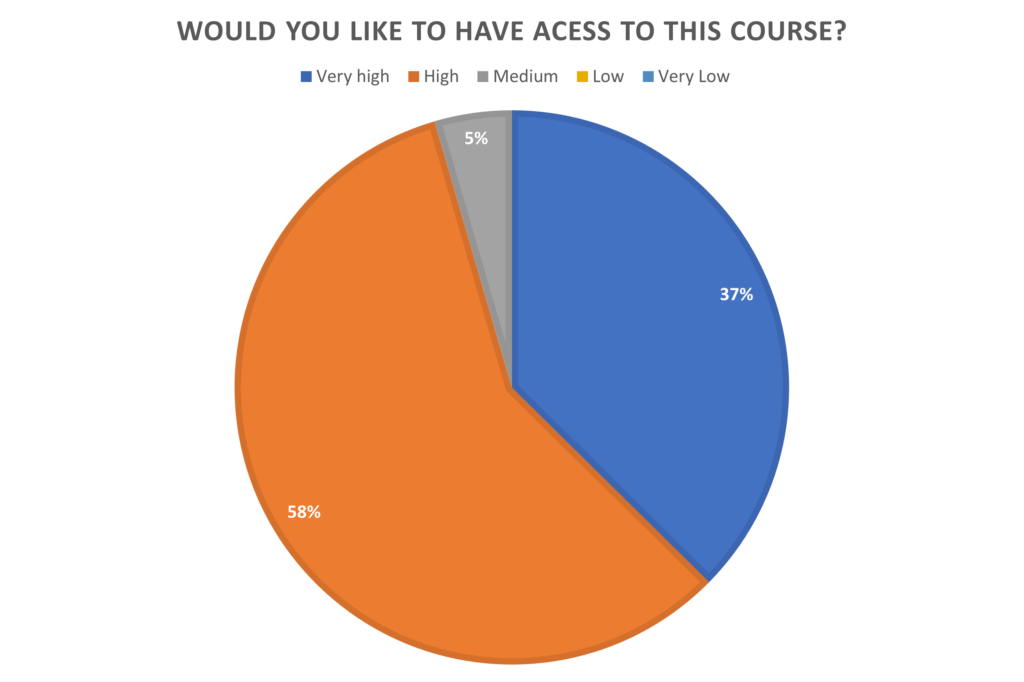
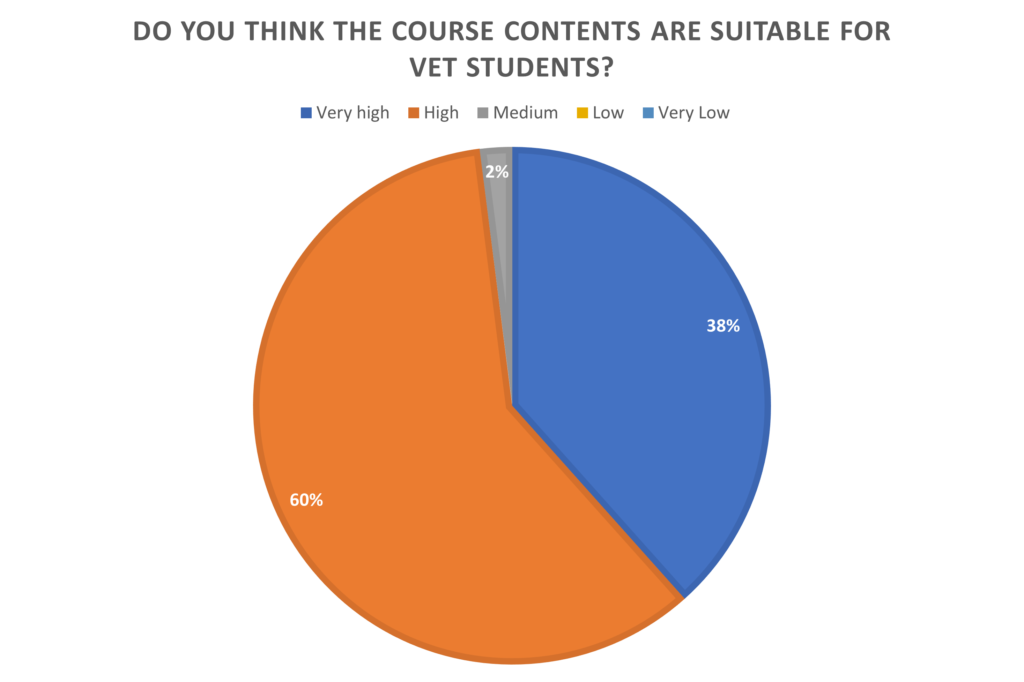
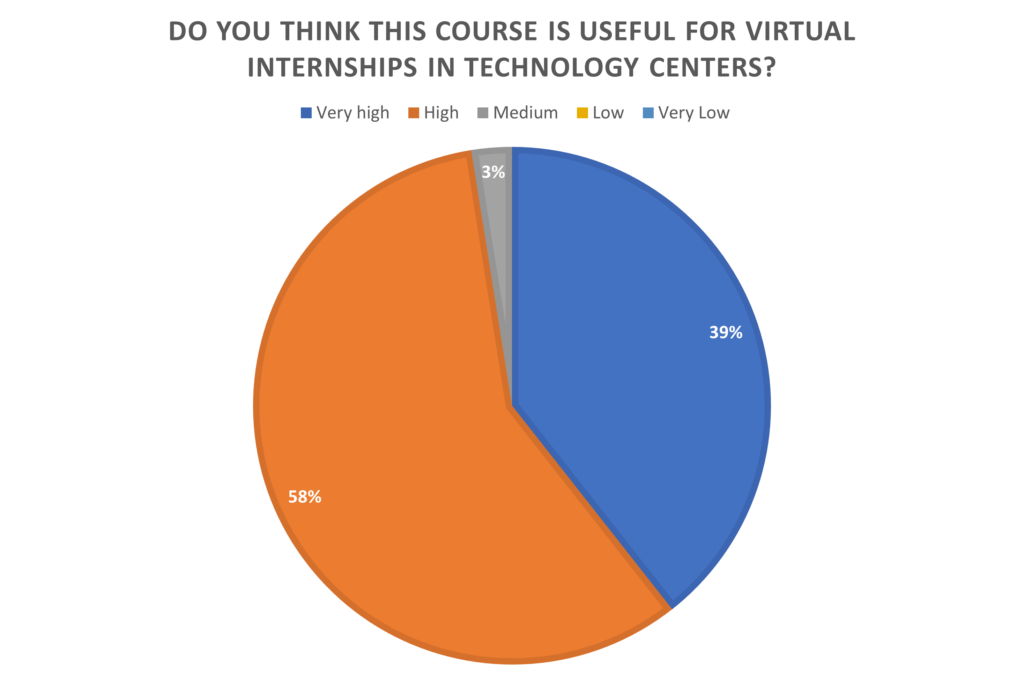
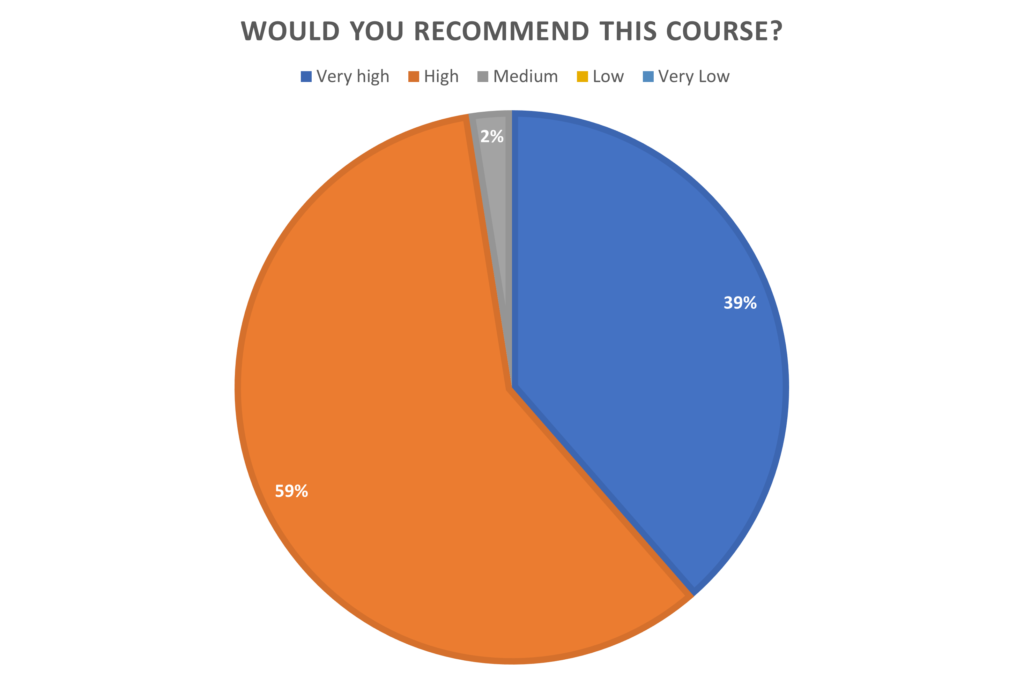
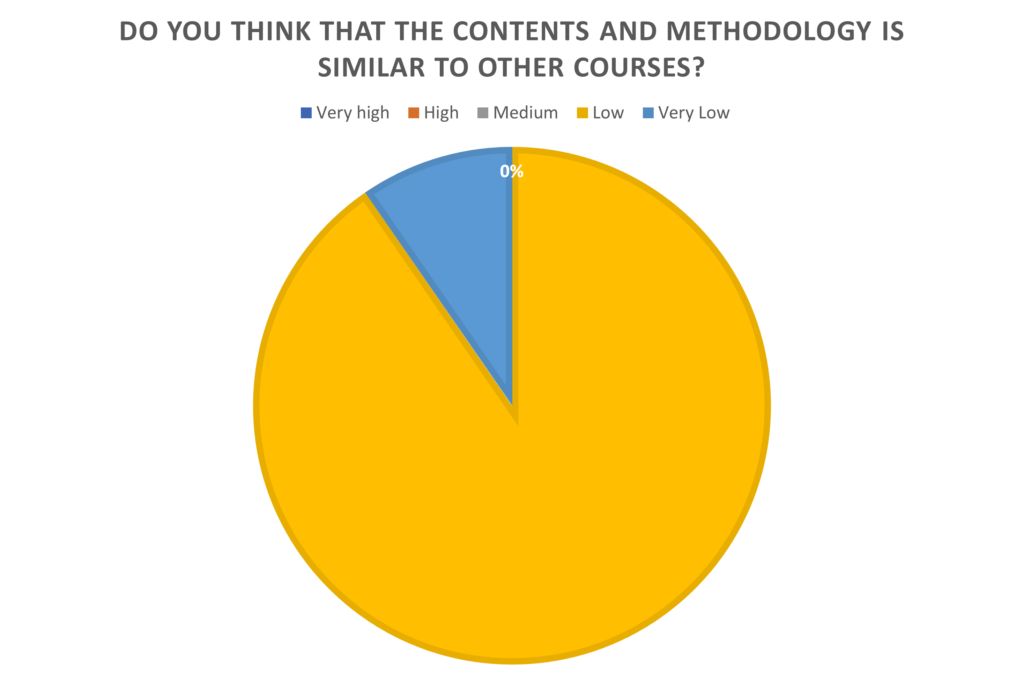
.
TANGIBLE RESULTS
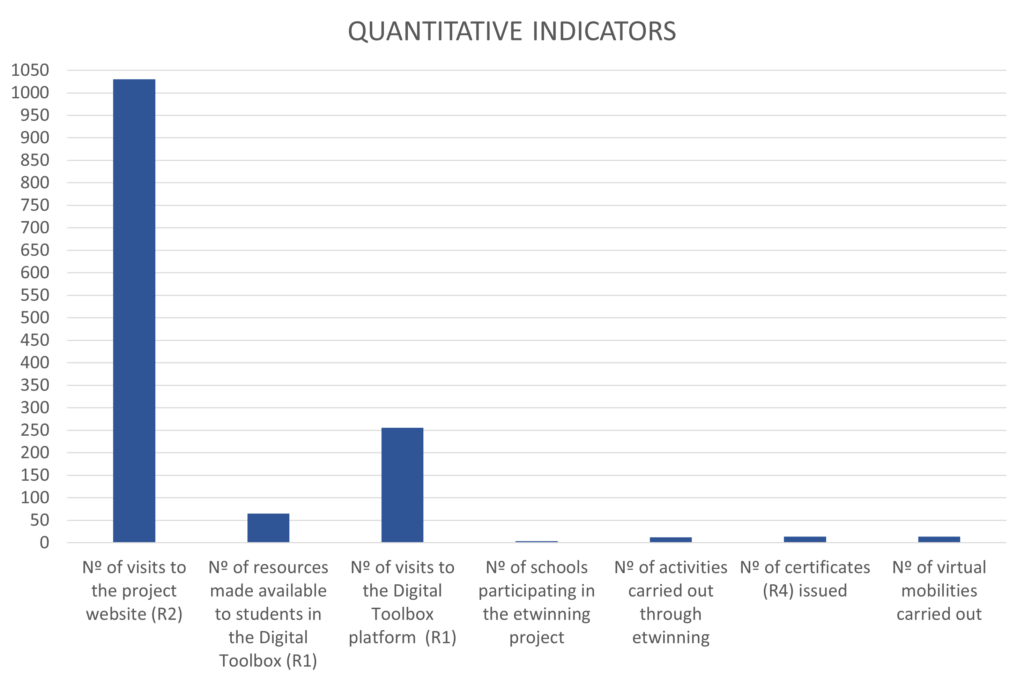
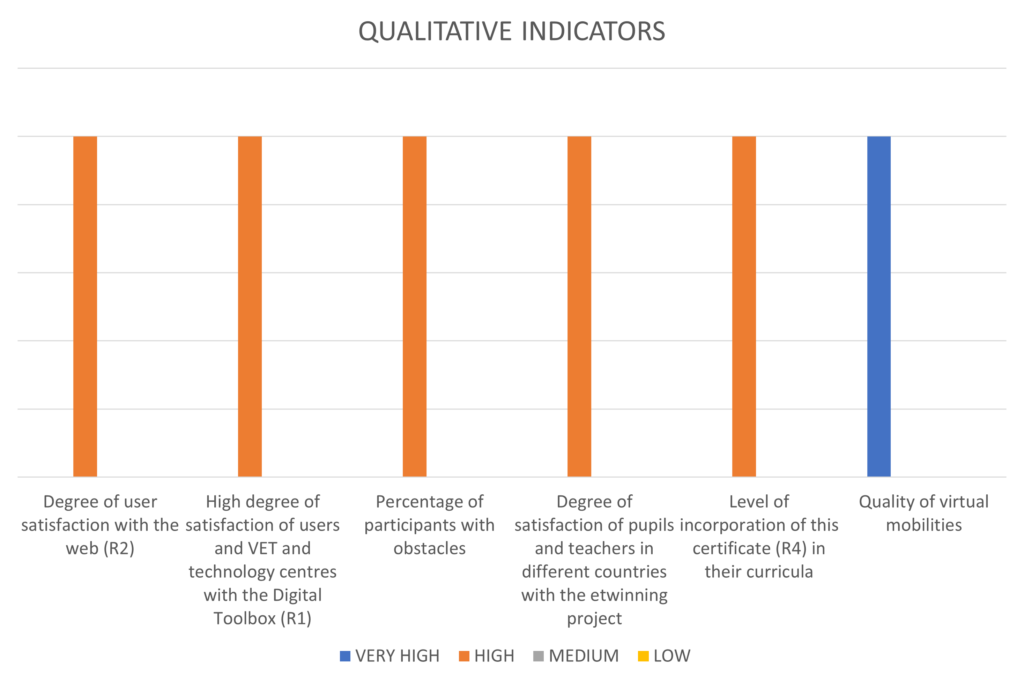
.
STRUCTURAL RESULTS
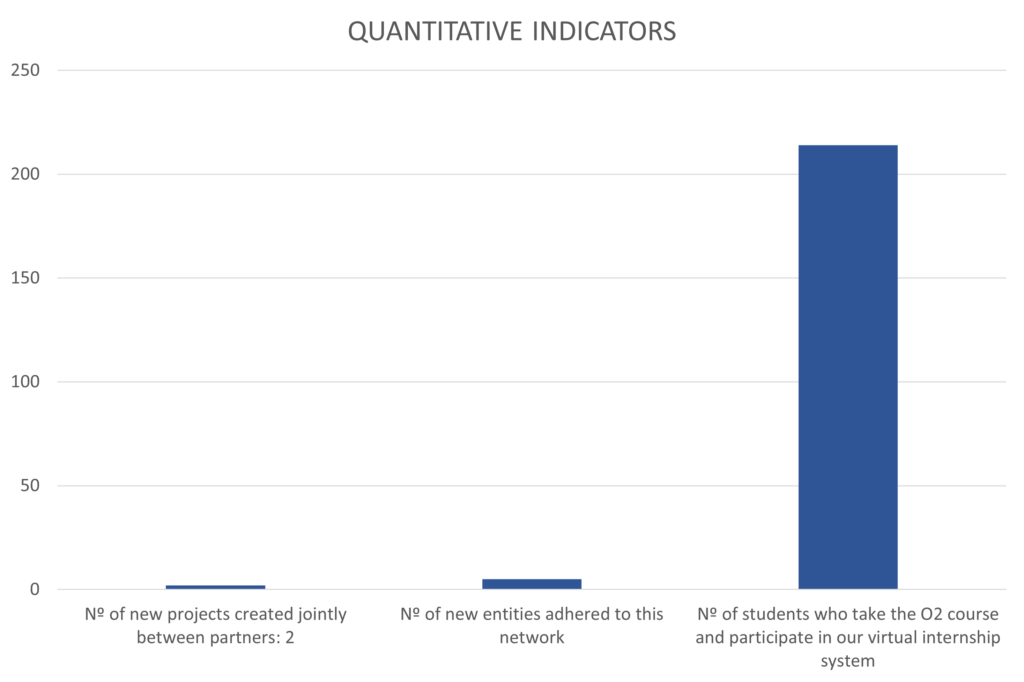
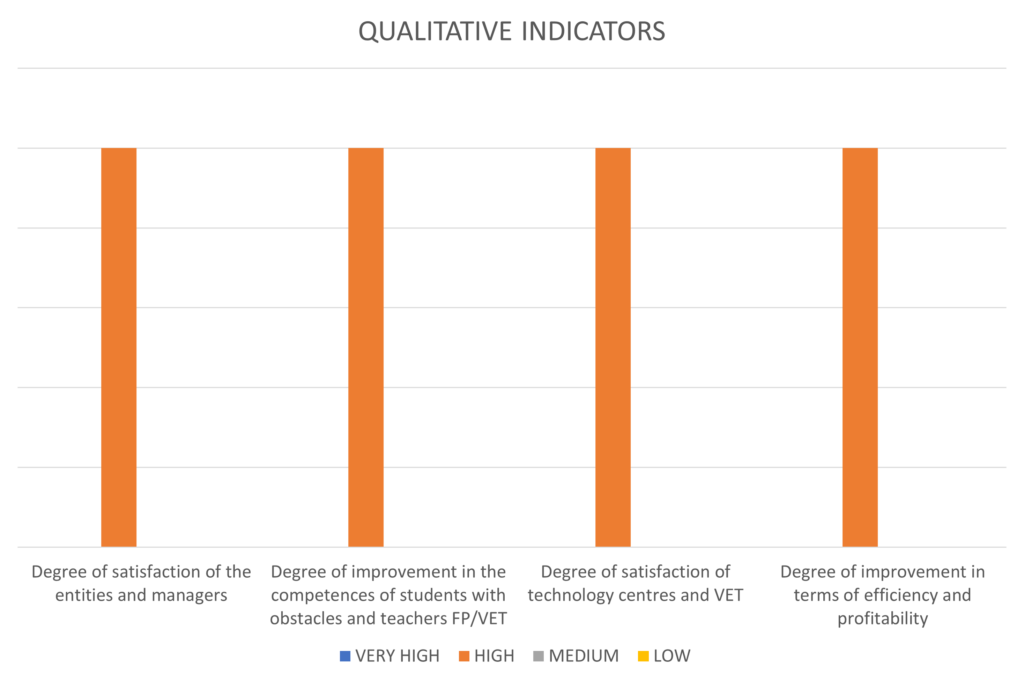
.
PILOT TEST
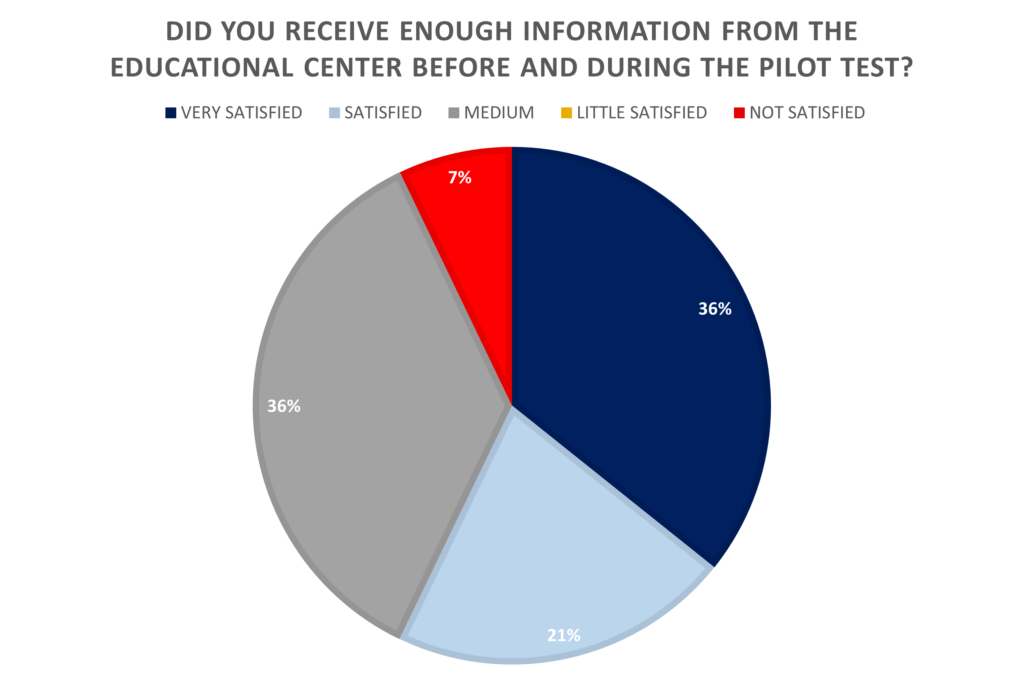
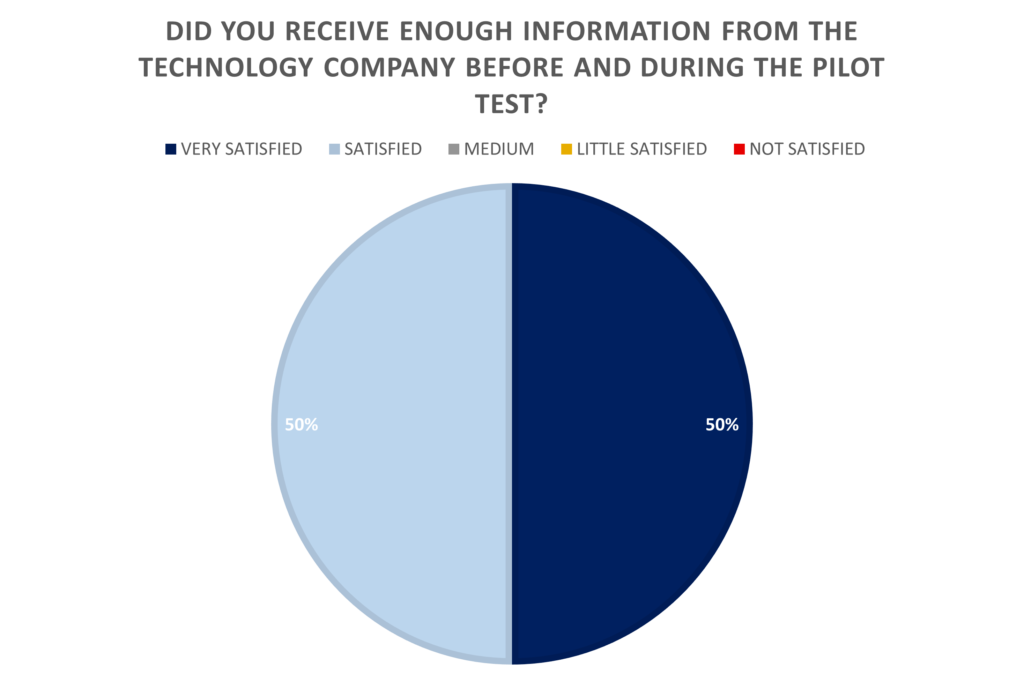
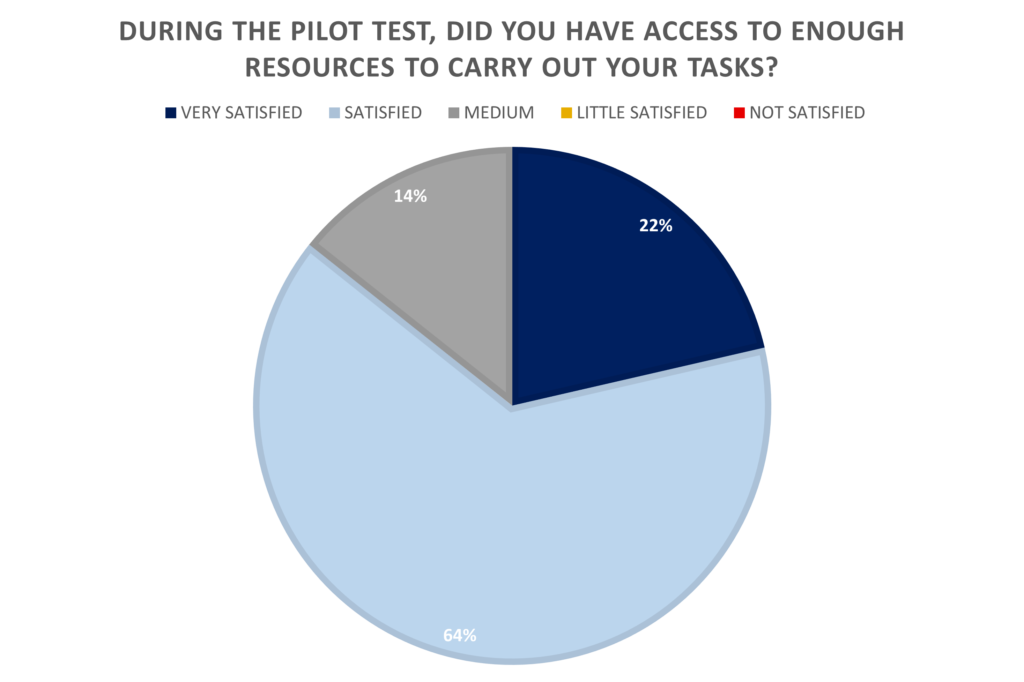
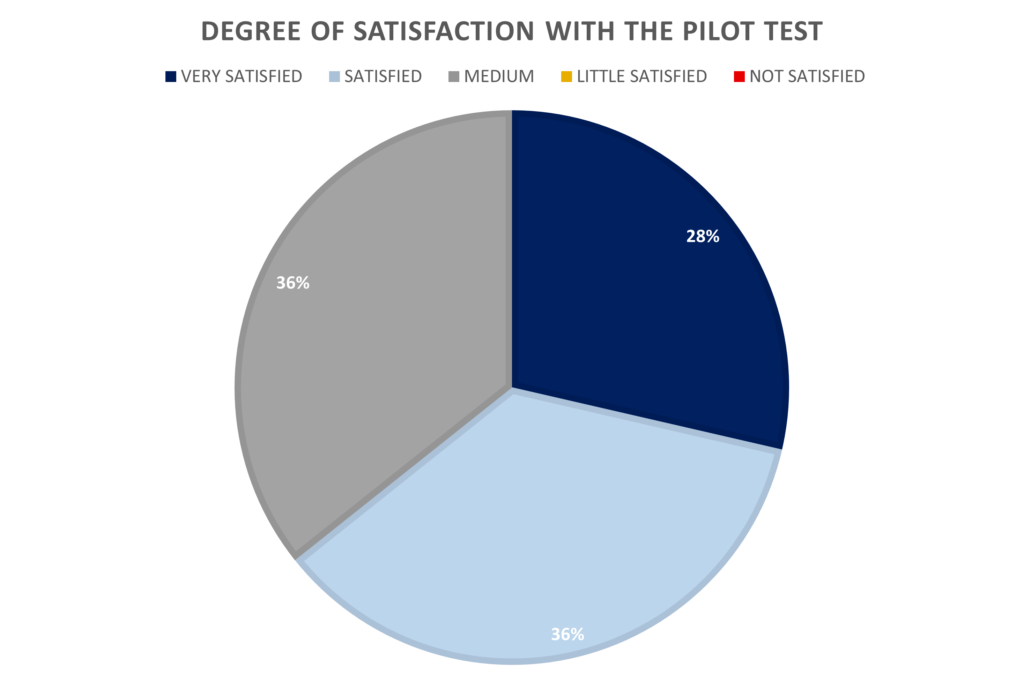
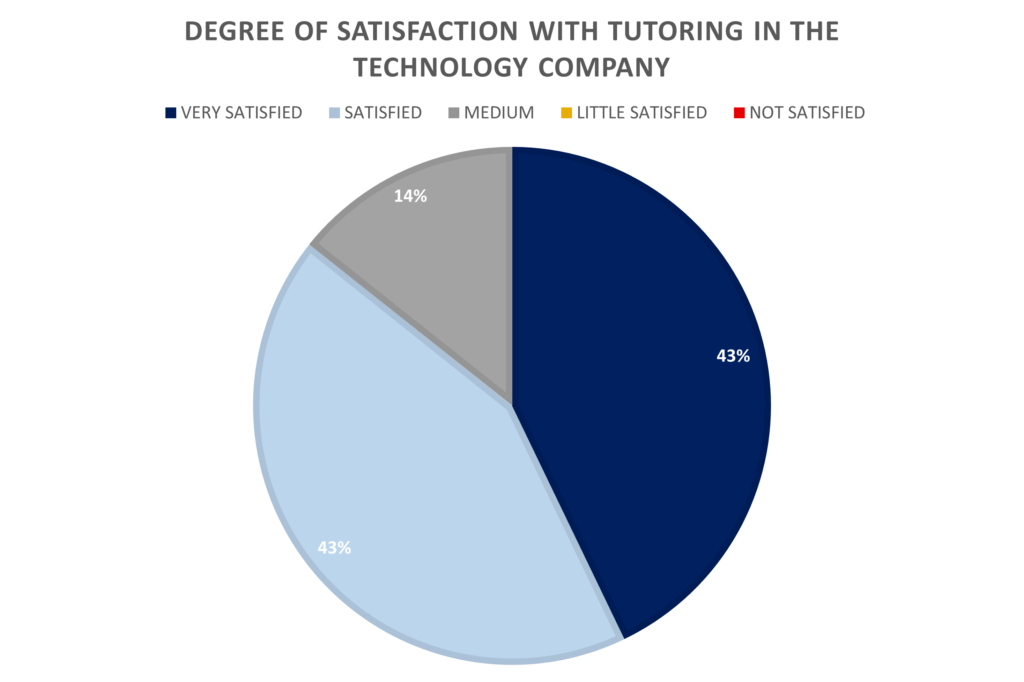
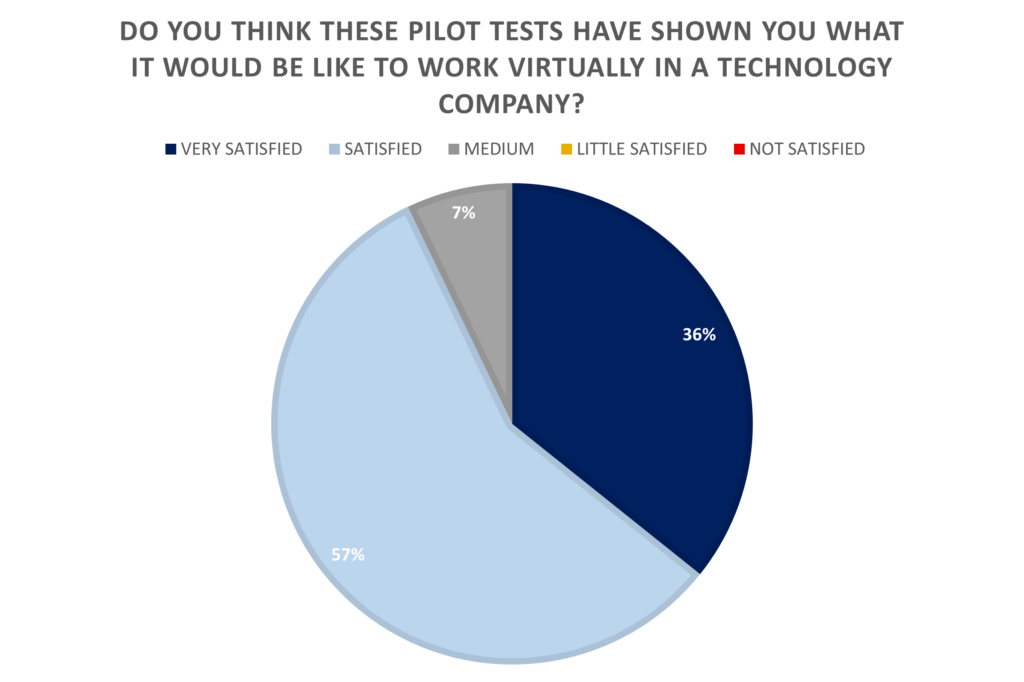
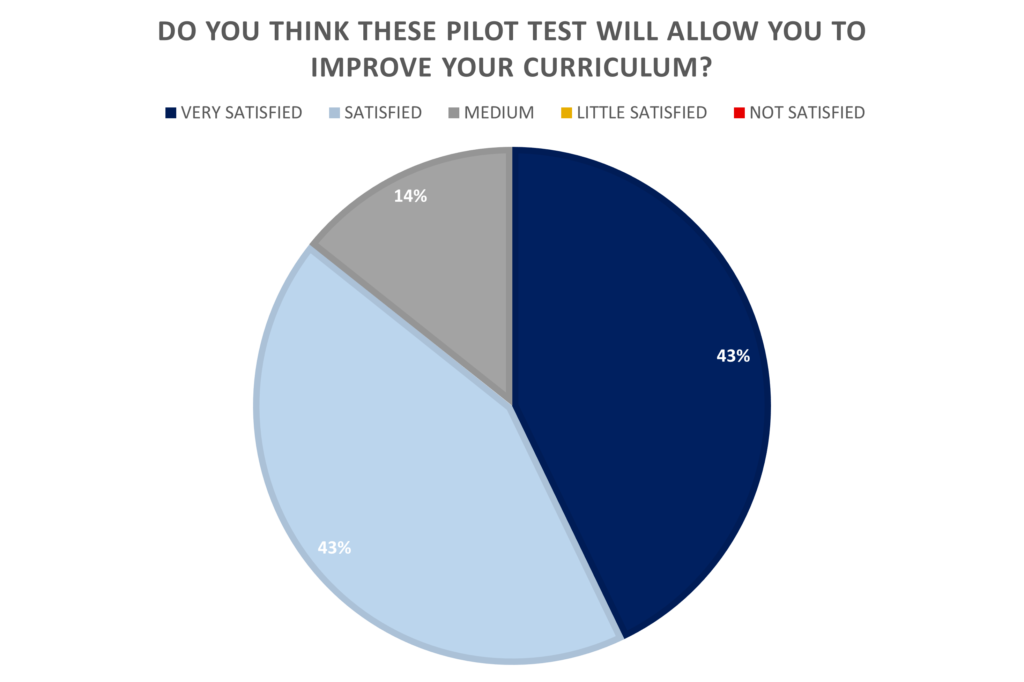
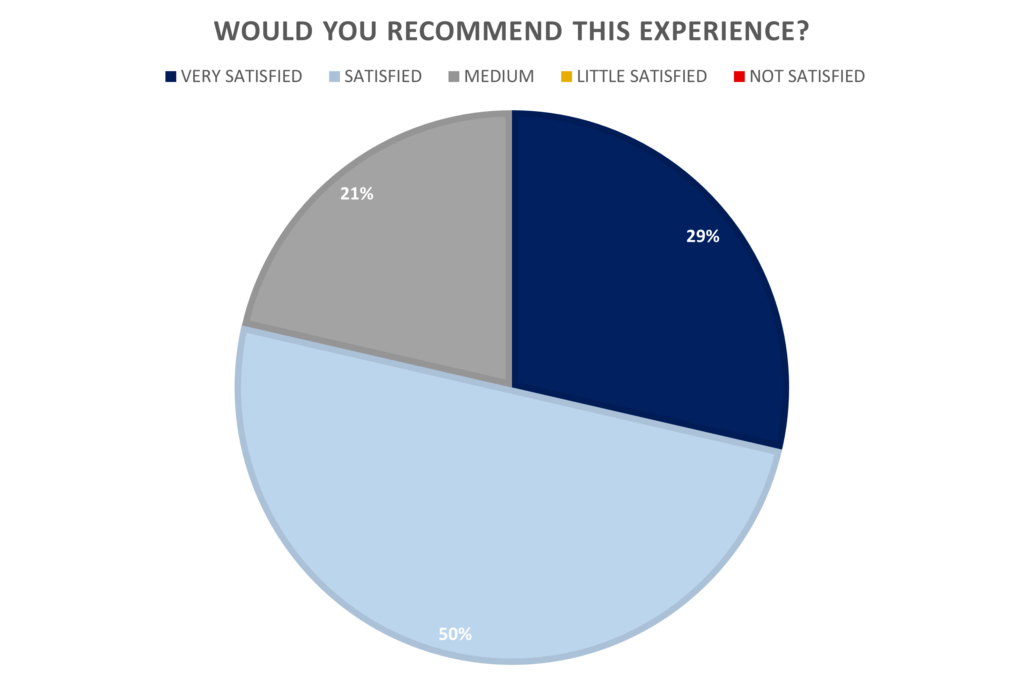
.
IMPACT
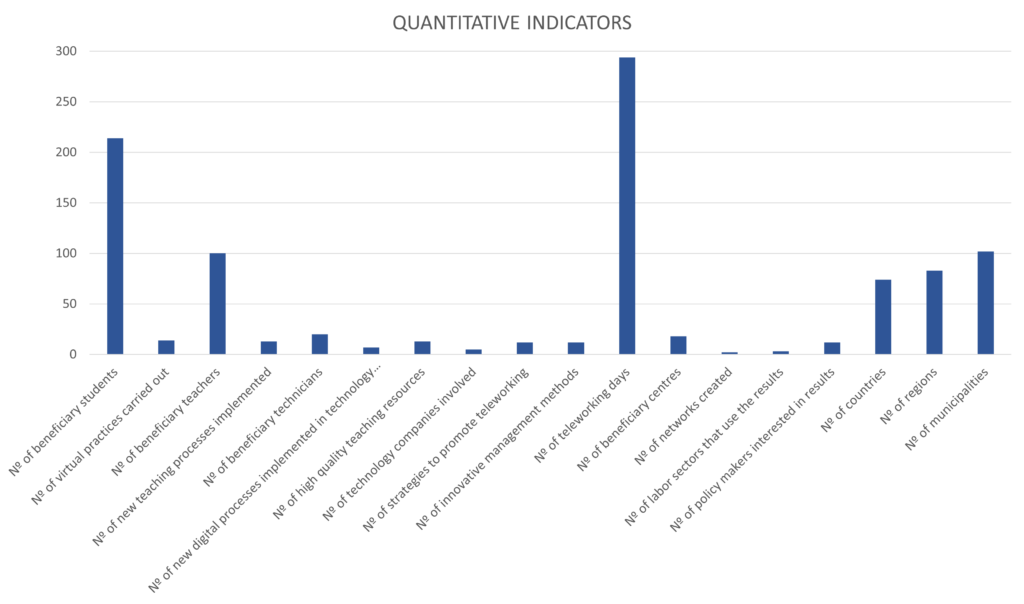
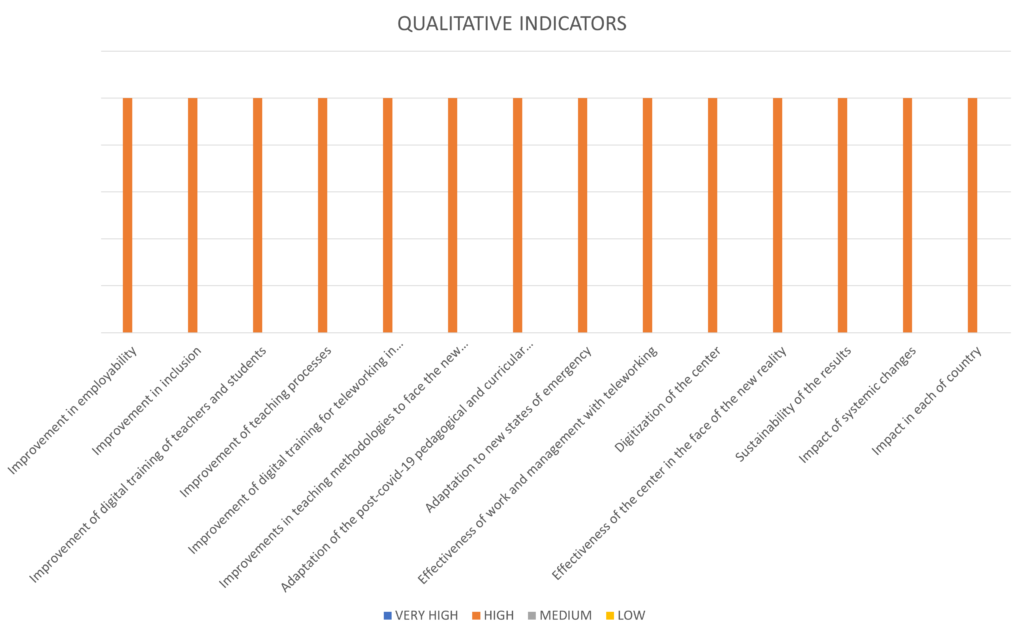
.
EXTERNAL EVALUATION
An external committee of experts in innovative educational methodologies has positively evaluated the results and its educational impact of the project. In order to validate the quality of the project and the results generated in the project, a large number of international expert evaluators in the field of innovative education have been contacted (several of them members of the evaluation committees of the most relevant international congresses on the subject educational innovation).
The expert committee was made up of:
| Expert | Entity | Country |
| Adriana Agnes Repellin-Moreno | Universidad Panamericana | MEXICO |
| Aileen Cotter | Cork Institute of Technology | IRELAND |
| Akihiro Maeda | Ryukoku University | JAPAN |
| Alia Ammar | Drexel University | UNITED STATES |
| Alexander Mikroyannidis | The Open University | UNITED KINGDOM |
| Aline Grunewald Nichele | Federal Institute of Education, Science and Technology of Rio Grande do Sul | BRAZIL |
| Anna Romagnuolo | University of Tuscia | ITALY |
| Ana Lucas | Universidade Europeia / Laureate International Universities | PORTUGAL |
| Ana Paula Lopes | Polytechnic Institute of Oporto | PORTUGAL |
| Anamarija Štefić | Josip Juraj Strossmayer University of Osijek | CROATIA |
| Andrew Youde | The University of Huddersfield | UNITED KINGDOM |
| Anemona Peres | Frontex | POLAND |
| Asako Ohno | Osaka Sangyo University | JAPAN |
| Bob Barrett | American Public University | UNITED STATES |
| Boza Tasic | Ryerson University | CANADA |
| Bozena Mannova | Czech Technical University in Prague | CZECH REPUBLIC |
| Breno Deffanti | Graded – The American School of São Paulo | BRAZIL |
| Catherine O’Donnell | Ulster University | UNITED KINGDOM |
| Chang-Tik Chan | Monash University Malaysia | MALAYSIA |
| Chiew Hong Ng | National Institute of Education | SINGAPORE |
| Christopher Evans | Cardiff University | UNITED KINGDOM |
| Craig Loewen | University of Lethbridge | CANADA |
| Craig Walker | Oklahoma State Department of Education | UNITED STATES |
| Cynthia Rosas Magallanes | Instituto Mexicano del Seguro Social (IMSS) | MEXICO |
| Daniel Abrahams | University of Arkansas – Fayetteville | UNITED STATES |
| Darren Falconer | The University of Western Australia | AUSTRALIA |
| David Jennings | University College Dublin | IRELAND |
| Elena Savova | University of Library Studies and Information Technologies | BULGARIA |
| Elmaziye Özgür | Eastern Mediterranean University | CYPRUS |
| Ewa Bogacz-Wojtanowska | Jagiellonian University | POLAND |
| Fausto Brevi | Politecnico di Milano | ITALY |
| Fedor Duzhin | Nanyang Technological University | SINGAPORE |
| Fernando Enrique Ortiz Rodriguez | Universidad Autonoma de Tamaulipas | MEXICO |
| Filomena Soares | Polytechnic of Porto | PORTUGAL |
| Frank Brosow | University of Education Ludwigsburg | GERMANY |
| Hanna-Riitta Kymäläinen | University of Helsinki | FINLAND |
| Helen Reddy | University of Nottingham | UNITED KINGDOM |
| Helmut Wöllik | Carinthia University of Applied Sciences | AUSTRIA |
| Hiroyuki Obari | Aoyama Gakuin University | JAPAN |
| Ineta Helmane | University of Latvia | LATVIA |
| Iolie Nicolaidou | Cyprus University of Technology | CYPRUS |
| Jana Bérešová | University of Trnava | SLOVAKIA |
| Jane Davies | University of Nottingham | MALAYSIA |
| James Mackay | Wellington Institute of Technology | NEW ZEALAND |
| Jaroslaw Kujawski | University of Gdansk | POLAND |
| Joanna Richardson | City, University of London | UNITED KINGDOM |
| João Monteiro | ISPGAYA – Instituto Superior Politécnico Gaya | PORTUGAL |
| John Craft | Appalachian State University | UNITED STATES |
| Joseph Agbenyega | Emirates College for Advanced Education | UNITED ARAB EMIRATES |
| Kari Krell | MacEwan University | CANADA |
| Kathleen O’Sullivan | University College Cork | IRELAND |
| Kay Gallagher | Zayed University | UNITED ARAB EMIRATES |
| Laila Nordstrand Berg | Western Norway University of Applied Sciences | NORWAY |
| Laura Zizka | Ecole Hôtelière de Lausanne / HES-SO University of Applied Sciences and Arts Western Switzerland | SWITZERLAND |
| Leonor Silva de Mattos | University of Hertfordshire | UNITED KINGDOM |
| Louise Robson | University of Sheffield | UNITED KINGDOM |
| Luis Roseiro | Instituto Superior de Engenharia de Coimbra | PORTUGAL |
| Luke Raeside | Technological University Dublin | IRELAND |
| Manuel Gericota | Polytechnic of Porto | PORTUGAL |
| Maria Luisa Spreafico | Politecnico di Torino | ITALY |
| Maria Susy Rogers | The University of South Wales | UNITED KINGDOM |
| Marion Milton | Unviersity of Notre Dame | AUSTRALIA |
| Maria Rudneva | RUDN University (Peoples’ Friendship University of Russia) | RUSSIAN FEDERATION |
| Martha Leal-Gonzalez | Institute of Innovation and Technology Transfer of Nuevo Leon | MEXICO |
| Martina Bode | University of Illinois at Chicago | UNITED STATES |
| Matome Mashiapata | University of South Africa | SOUTH AFRICA |
| Mayaugust Finkenberg | Stevenson University | UNITED STATES |
| Mike Hillis | California Lutheran University | UNITED STATES |
| Michelle Flood | Royal College of Surgeons | IRELAND |
| Monika Jakubiak | Maria Curie-Sklodowska University | POLAND |
| Nathalie Wesseling | Amsterdam University of Applied Sciences | NETHERLANDS |
| Orlando Belo | Universidade do Minho | PORTUGAL |
| Paul Hunter | IMD, International Institute for Management Development | SWITZERLAND |
| Peter Gabor | University of Calgary | CANADA |
| Peter Haber | Salzburg University of Applied Sciences | AUSTRIA |
| Pia Palotie | Eezy Tyollisyyspalvelut | FINLAND |
| Polona Gradišek | University of Ljubljana | SLOVENIA |
| Rebecca Allen | Mount St. Joseph University | UNITED STATES |
| Remigijus Bubnys | Vilnius University | LITHUANIA |
| Rosa Cendros Araujo | Western University | CANADA |
| Sandra Gomes | IPAM | PORTUGAL |
| Sean Lancastle | University of Bristol | UNITED KINGDOM |
| Sinéad McCotter | University of York | UNITED KINGDOM |
| Siobhan O’Sullivan | Khalifa University in Medical Education | UNITED ARAB EMIRATES |
| Suzy Connor | Kyushu University | JAPAN |
| Sylvia Dempsey | Cork Institute of Technology | IRELAND |
| Taija Votkin | Aalto University | FINLAND |
| Taketoshi Yokemura | Shibaura Institute of Technology | JAPAN |
| Tammy Ladwig | University of Wisconsin Fox Valley | UNITED STATES |
| Teemu Patala | Context Learning Finland Oy | FINLAND |
| Teresa Cardoso | Universidade Aberta, LE@D | PORTUGAL |
| Thomas Rachfall | Hochschule Merseburg | GERMANY |
| Thomas Lavery | The Royal Academy of Engineering | UNITED KINGDOM |
| Tunde Szecsi | Florida Gulf Coast University | UNITED STATES |
| Victor Fester | University of Waikato | NEW ZEALAND |
| Victoria Brennan | Liverpool John Moores University | UNITED KINGDOM |
| Victoria Kompanets | Lappeenranta University of Technology | FINLAND |
| Wayne Bailey | The University of Huddersfield | UNITED KINGDOM |
| Wendy Gorton | EdTechTeam | UNITED STATES |
